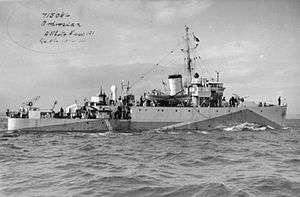HMS Ardrossan (J131)
HMS Ardrossan was a Bangor-class minesweepers built for the Royal Navy during the Second World War.
 | |
| History | |
|---|---|
| Name: | HMS Ardrossan |
| Builder: | Blyth Shipbuilding Company, Blyth, Northumberland |
| Laid down: | 6 September 1940 |
| Launched: | 22 July 1941 |
| Commissioned: | 21 May 1942 |
| Honours and awards: | NORTH SEA 1942, NORMANDY 1944 |
| Fate: |
|
| General characteristics | |
| Class and type: | Bangor-class minesweeper |
| Displacement: |
|
| Length: | 174 ft (53 m) o/a |
| Beam: | 28 ft 6 in (8.69 m) |
| Draught: | 10 ft 3 in (3.12 m) |
| Installed power: |
|
| Propulsion: |
|
| Speed: | 16 knots (30 km/h; 18 mph) |
| Range: | 2,800 nmi (5,200 km; 3,200 mi) at 10 knots (19 km/h; 12 mph) |
| Complement: | 60 |
| Armament: |
|
Design and description
The Bangor class was designed as a small minesweeper that could be easily built in large numbers by civilian shipyards; as steam turbines were difficult to manufacture, the ships were designed to accept a wide variety of engines. Ardrossan displaced 656 long tons (667 t) at standard load and 820 long tons (830 t) at deep load. The ship had an overall length of 174 feet (53.0 m), a beam of 28 feet 6 inches (8.7 m) and a draught of 10 feet 3 inches (3.1 m).[1] The ship's complement consisted of 60 officers and ratings.[2]
She was powered by two Metrovick-Curtis geared steam turbines, each driving one shaft, using steam provided by two Admiralty three-drum boilers. The engines produced a total of 2,000 shaft horsepower (1,500 kW) and gave a maximum speed of 16 knots (30 km/h; 18 mph). Ardrossan carried a maximum of 160 long tons (163 t) of fuel oil that gave her a range of 2,800 nautical miles (5,200 km; 3,200 mi) at 10 knots (19 km/h; 12 mph).[3]
The turbine-powered Bangors were armed with a 3-inch (76 mm) anti-aircraft gun and a single QF 2-pounder (4 cm) AA gun. In some ships the 2-pounder was replaced a single or twin 20 mm Oerlikon AA gun, while most ships were fitted with four additional single Oerlikon mounts over the course of the war.[3] For escort work, her minesweeping gear could be exchanged for around 40 depth charges.[2]
Construction and career
Ardrossan was built by Blyth Shipbuilding Company, at Blyth, Northumberland and launched on 22 July 1941. Thus far she has been the only ship of the Royal Navy named after the Scottish town of Ardrossan. She had a relatively quiet wartime career and was sold on 1 January 1948 for breaking up. She arrived at the breaker's yard at Thornaby-on-Tees on 19 August 1948.
References
- Lenton, pp. 253–54
- Chesneau, p. 64
- Lenton, p. 254
Bibliography
- Chesneau, Roger, ed. (1980). Conway's All the World's Fighting Ships 1922–1946. Greenwich, UK: Conway Maritime Press. ISBN 0-85177-146-7.
- Colledge, J. J.; Warlow, Ben (2006) [1969]. Ships of the Royal Navy: The Complete Record of all Fighting Ships of the Royal Navy (Rev. ed.). London: Chatham Publishing. ISBN 978-1-86176-281-8.
- Lenton, H. T. (1998). British & Empire Warships of the Second World War. Annapolis, Maryland: Naval Institute Press. ISBN 1-55750-048-7.
- Warlow, Ben, Lt. Cdr., Royal Navy (2004) Battle Honours of the Royal Navy, Maritime Books: Liskeard, UK ISBN 1-904459-05-6